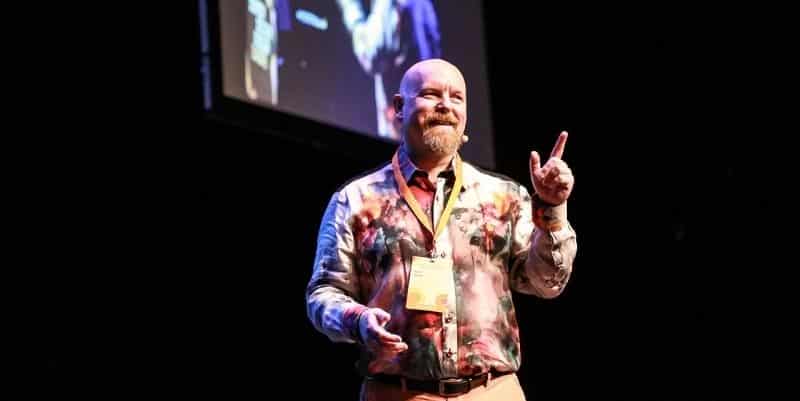Kent Beck biography and books

Kent Beck (1961) is an American software engineer and the developer of Extreme Programming (XP). Kent Beck is considered a pioneer of design patterns for software development.
The biography of Kent Beck
Technology was introduced to Kent Beck during his upbringing. He was born in Silicon Valley to an electrical engineer and his grandfather was a radio fanatic. So it was not surprising that he would follow in similar technological footsteps.
Kent Beck was a student at the University of Oregon between 1979 and 1987, earning bachelor’s and master’s degrees in computer and information sciences. In 1996, he began to work on the Chrysler Comprehensive Compensation System. During this time, he also introduced Ron Jeffries to the company.
XP was developed during a period when he advised Smalltalk projects in the 1980s and 1990s. Smalltalk is an object-oriented programming language. Smalltalk was founded to investigate how programming can best be taught to children.
The team estimated that it would take about a year for certain product elements to be completed. A year later they introduced a new way of working. This way of working is now known as Extreme Programming (XP).
The XP software development method is known as a counterpart to traditional software development methods, which are considered rigid and formal.
He is also one of the original signatories of the Agile Manifesto, a document outlining the then new method. Extreme Programming (XP) and Agile are strongly linked to Test Driven Development (TDD).
In 2011, Beck joined the company Facebook, today known as Meta. With decades of experience, he was convinced that he had an excellent understanding of the operation and application of software.
Still, he later had to realize that Facebook was unlike any company he’d worked for before and he needed to get serious about transforming his vision of software development.
He later said of the company Facebook that it is a very agile company, always ready for change. He mainly immersed himself in the codes on which Facebook is built and the culture.
Today, Kent Beck lives in San Francisco, California. In 2019, Beck joined the Gusto company as a software coach. Here he coaches technical teams in building payroll systems for smaller companies.
Famous quotes
- “Agitator and the Agitar Management Dashboard lower the barriers to accountability in software development and increase the value of developer testing.”
- “Beta testing is a symptom of weak testing practices and poor communication with customers.”
- “Brilliance in a scientist does not consist in being right more often but in being wrong about more interesting topics.”
- “Design should be easy in the sense that every step should be obviously and clearly identifiable. Simplify elements to make change simple so you can manage the technical risk.”
- “Developer testing is an important step towards accountability. It gives developers a way to demonstrate the quality of the software they produce.”
- “Do The Simplest Thing That Could Possibly Work.”
- “Extreme programming is an emotional experience.”
- “First you learn the value of abstraction, then you learn the cost of abstraction, then you’re ready to engineer.”
- “Given the choice between an extremely skilled loner and a competent-but-social programmer, XP teams consistently choose the more social candidate. The best interviewing technique is to have the candidate work with the team for a day. Pair programming provides an excellent test of technical and social skills.”
- “I found out that most programmers don’t like to test their software as intensely as I do.”
- “I lived near Santa Cruz for ten years, and the whole time, it bothered me what an exclusionary definition of ‘inclusion’ was in force. Social censure was applied to those who expressed unpopular or uncomfortable ideas.”
- “I think it’s a combination of technical and social factors that leads to all the defects in deployed software.”
- “I used Agitator on some code I had unit-tested, and it made me a better tester. As an Agitar Fellow, I look forward to the leverage of working with an outstanding organization as together we continue to improve the value of developer testing.”
- “If I’d had a charisma-ectomy in the beginning, XP would have gone nowhere.”
- “If you’re happy slamming some code together that more or less works and you’re happy never looking at the result again, TDD is not for you. TDD rests on a charmingly naïve geekoid assumption that if you write better code, you’ll be more successful. TDD helps you to pay attention to the right issu.es at the right time so you can make your designs cleaner, you can refine your designs as you learn.”
- “I’m not a great programmer; I’m just a good programmer with great habits.”
- “My great-grandfather played organ for silent movies. Talkies in, Gramps out.”
- “No matter the circumstance you can always improve. You can always start improving with yourself. You can always start improving today.”
- “One of the advantages of having to live with JUnit for 8 years is now we can look back and see which decisions we made worked nicely and which we would have done differently.”
- “Organizations want small changes in functionality on a more regular basis. An organization like Flickr deploys a new version of its software every half hour. This is a cycle that feeds on itself.”
- “People are looking for software development that actually does something useful… People are looking for partners who deliver when promised, and at a reasonable and transparent price. I believe that the days of being able to value price software are numbered.”
- “Rather than apply minutes of suspect reasoning, we can just ask the computer by making the change and running the tests.”
- “Received wisdom is that if you spend time up front getting the design right, you avoid costs later. But the longer you spend getting the design right, the more your upfront costs are, and the longer it takes for the software to start earning.”
- “Responsibility cannot be assigned; it can only be accepted. If someone tries to give you responsibility, only you can decide if you are responsible or if you aren’t.”
- “Sheet music, recording, radio, television, cassettes, CD burners, and file sharing have all invalidated, to some extent, the old model of making a living making music.”
- “The marketing of XP is very deliberate and conscious. Part of it is in co-opting the power of the media; I make sure I’m newsworthy from time to time. Part is in co-opting some of my publisher’s ad budget.”
- “The problem is, in software design, often the consequences of your decisions don’t become apparent for years.”
- “The world is changing, and I believe that, if I want to stay employed as a programmer, I’m going to have to change with it.”
- “The XP philosophy is to start where you are now and move towards the ideal. From where you are now, could you improve a little bit?”
- “There are musicians who want to make a living making music. There are listeners who want to listen to music. Complicating this relationship is a whole bunch of history: some of the music I want to listen to was made a while ago in a different economy. Some of the models of making a living making music are no longer valid but persist.”
- “There is a strong movement towards increased accountability for software developers and software development organizations.”
- “There’s a huge latent market for software development that’s just flat-out honest.”
- “We could talk, act, and dress funny. We were excused for socially inappropriate behavior: ‘Oh, he’s a programmer’. It was all because we knew this technology stuff that other people found completely mystifying.”
- “When Pandora doesn’t pay, and bars don’t pay, and weddings don’t pay, and nobody buys CDs or shirts or concert tickets or lessons, then the musician can’t make a living making music.”
- “Whether you draw diagrams that generate code or you type at a browser, you are coding.”
- “Without planning, we are individuals with haphazard connections and effectiveness. We are a team when we plan and work in harmony.”
- “Write tests until fear is transformed into boredom.”
Publications and Books by Kent Beck et al.
- 2008. Implementation Patterns. Addison-Wesley.
- 2004. JUnit Pocket Guide. O’Reilly.
- 2004. Extreme Programming Explained: Embrace Change, 2nd Edition. With Cynthia Andres. Addison-Wesley.
- 2003. Contributing to Eclipse: Principles, Patterns, and Plugins. With Erich Gamma. Addison-Wesley.
- 2002. Test-Driven Development by Example. Addison-Wesley.
- 2000. Planning Extreme Programming. With Martin Fowler. Addison-Wesley.
- 2000. Extreme Programming Explained: Embrace Change. Addison-Wesley. Winner of the Jolt Productivity Award.
- 1997. Smalltalk Best Practice Patterns. Prentice Hall.
- 1996. Kent Beck’s Guide to Better Smalltalk : A Sorted Collection. Cambridge University Press.
- 1989. Simple Smalltalk Testing: With Patterns. SUnit framework, origin of xUnit frameworks.
- 1989. A Laboratory For Teaching Object-Oriented Thinking. With Ward Cunningham. OOPSLA’89.
- 1987. Using Pattern Languages for Object-Oriented Programs. With Ward Cunningham. OOPSLA’87.
How to cite this article:
Janse, B. (2022). Kent Beck. Retrieved [insert date] from Toolshero: https://www.toolshero.com/toolsheroes/kent-beck/
Original publication date: 09/01/2022 | Last update: 01/17/2024
Add a link to this page on your website:
<a href=” https://www.toolshero.com/toolsheroes/kent-beck/”>Toolshero: Kent Beck</a>











